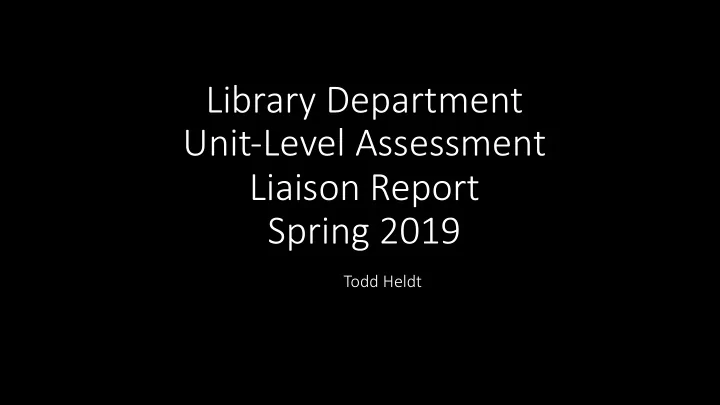

Library Department Unit-Level Assessment Liaison Report Spring 2019 Todd Heldt
We We continue to evolve! It is an ongoing process of continual revelation and awe!
B B u u t t w w e e f f r r o o e e c c m m u u s s a a : : i i n n c c o o m m m m i i t t t t e e d d t t o o o o u u r r c c e e n n t t r r a a l l
De Depar artmental O al Outcomes!
But we thought our results from Fall 2018 could be improved upon! This is the very heart and soul of assessment: Continuous improvement!
We We Re Revised to tools! The old one had a research question that could The new one has a more focused research question: have been confusing:
Fi Findi ndings ngs w were mi mixed: d: Fall 2018 Keyword Results Keyword Assessment Results Fall 2018 On scale of 1-3 where 3=complete mastery and 1=not meeting the outcome Keyword Assessment Results Spring 2019
Fi Findi ndings ngs w were mi mixed: d: Boolean Operator Assessment Results Fall 2018 On scale of 1-3 where 3=complete mastery and 1=not meeting the outcome Boolean Operator Assessment Results Spring 2019
Other Li Librarians Share Wisdom In Dangers and Opportunities: A Conceptual Map of Information Literacy Assessment Approaches Megan Oakleaf looks at different approaches to skills-based assessment: Fixed choice tests, performance assessments, and rubrics all contained inherent drawbacks, ranging from lack of depth, time limitations, or expense. Dhawan and Chen in Library Instruction for First year Students , cogently sum the problem: Given that IL is interwoven into the entire undergraduate curriculum and that the total instruction time is 50 minutes, the foremost questions [are]: what can be covered in 50 minutes? How can it be assessed meaningfully? And is it possible to assess accurately without taking away valuable class time?
What can we do? Given these roadblocks, many librarians avoid assessment of one-shots altogether. Those who do often use assessments that are either indirect or of the affective domain. Data from such tools seems less informative than direct, skills-based data. But 50 minutes is not much time. Class time is better spent on the lesson than it is in the assessment of that lesson. Even then, the information is new to students and comes at them quickly. Can anyone absorb it all in a single meeting?
Different Roles, Different Measures Librarians have dual roles: We teach credit-bearing information literacy courses, in which we serve as an academic department. But we also teach one-shots, in which we serve a slightly different role more akin to student support.
Two Roles? Two Sets of Outcomes!
For credit-bearing courses: Ø Research Skills Ø Critical Thinking Skills Ø Information Organization Skills Ø Information Ethics These require authentic and skills-based assessment tools!
For One-Shots: There is a whole world of affective domain information that we would benefit from measuring: Ø Do students feel that can count on us to help them? Ø Do they feel welcomed? Ø Are they comfortable navigating the website? Ø Do they feel more confident in their abilities? Ø More sound in their understanding?
Al All of of i it i is i impor ortant! The next step is to draft a second set of outcomes within the affective domain in order to capture the important data that one-shot assessment could provide.
Recommend
More recommend